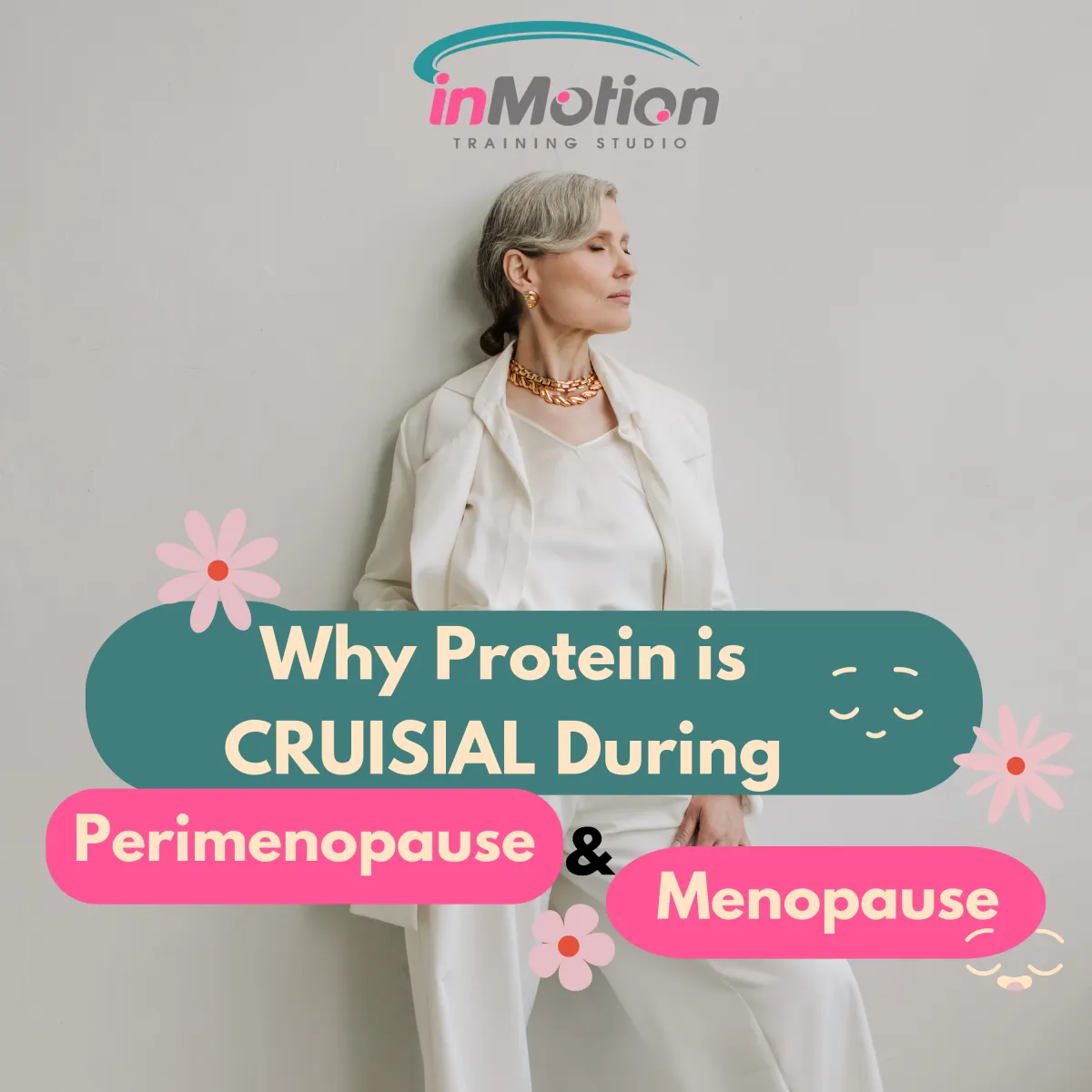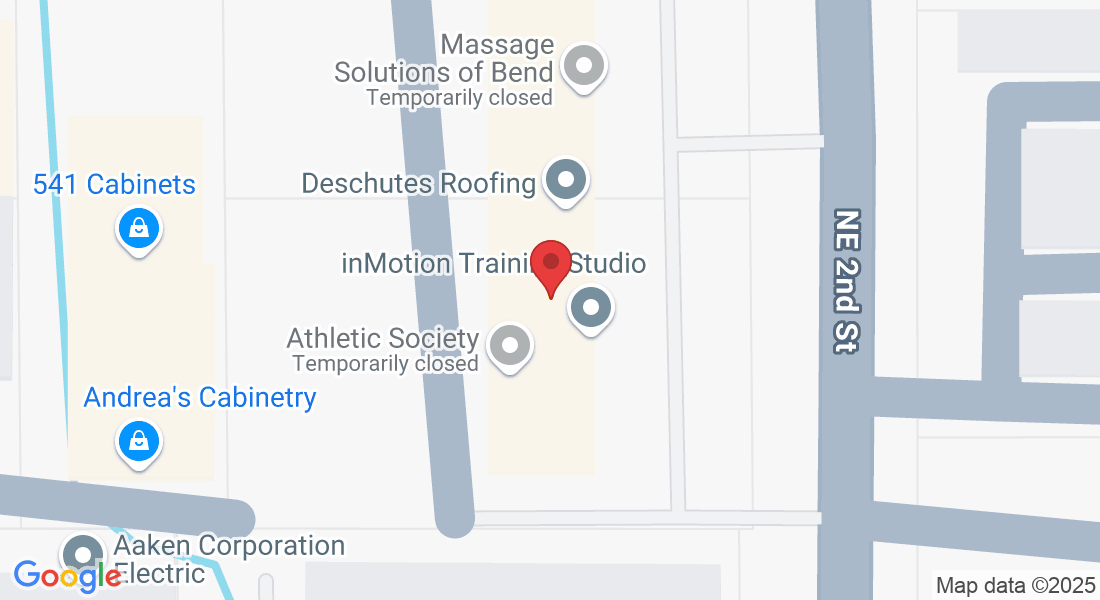blog | inmotion training studio

Why Protein Is Crucial During Perimenopause and Menopause
Why Protein Is Crucial During Perimenopause and Menopause (Midlife)
As women transition through perimenopause and menopause, the body undergoes significant hormonal shifts that can impact muscle mass, energy levels, and overall health. While these changes are natural, they can often feel frustrating—especially when it seems harder to maintain strength or stay lean.
One of the most powerful tools women can use to navigate this phase? Protein.
Protein plays a key role in supporting your body during perimenopause and menopause, helping to counteract some of the challenges that come with this transition. Let’s dive into why protein is so important and how to make it a consistent part of your diet.
Grab our FREE Protein Guide Today
How Hormones Impact Your Body During Menopause
As estrogen levels decline during perimenopause and menopause, several physical changes occur:
Muscle Loss: Lower estrogen levels are linked to a gradual loss of muscle mass (known as sarcopenia). This can slow metabolism and affect strength.
Bone Density Decline: Women are at a higher risk for osteoporosis due to decreased estrogen, which impacts bone health.
Changes in Body Composition: Many women notice increased fat storage, particularly around the midsection, even if their weight stays the same.
Protein Increases Satiety
Protein is the most satiating macronutrient, meaning it keeps you feeling fuller for longer. This can help reduce snacking and overeating plus manage cravings, especially for carb-heavy or sugary foods, which tend to spike and crash your energy levels.
When you prioritize protein at every meal, you naturally consume fewer calories throughout the day.
Protein Stabilizes Blood Sugar Levels
As estrogen declines, the body becomes more prone to insulin resistance, making blood sugar fluctuations more common. These ups and downs can lead to increased hunger and fat storage, especially around the midsection.
Protein helps stabilize blood sugar by slowing the absorption of carbohydrates. This prevents energy crashes and reduces the likelihood of storing excess calories as fat.
Eating enough protein can directly address these challenges and help you feel stronger, healthier, and more energized.
Why Protein Is Essential During Perimenopause and Menopause
Preserves Muscle Mass
Muscle naturally decreases with age, but protein can help counteract this loss. It provides the building blocks (amino acids) needed to repair and maintain muscle tissue, especially when combined with strength training.Boosts Metabolism
Muscle is metabolically active, meaning it burns more calories than fat—even at rest. By maintaining muscle mass with adequate protein, you can support a healthy metabolism.Improves Bone Health
Protein, combined with weight-bearing exercises, helps improve bone density and reduce the risk of fractures as you age.Supports Recovery and Reduces Fatigue
Protein is essential for repairing tissues after workouts and other daily activities, helping you recover faster and stay energized.Helps with Weight Management
Protein is highly satiating, meaning it keeps you fuller longer. This can reduce cravings and help prevent overeating, making it easier to manage weight during hormonal transitions.
How Much Protein Do You Need?
During perimenopause and menopause, women often need more protein than they did in their younger years. A good rule of thumb is to aim for:
0.8-1 gram of protein per pound of body weight.
For example, if you weigh 150 pounds, that’s about 120-150 grams of protein per day.
Spread your protein intake evenly throughout the day to maximize absorption and muscle protein synthesis.
Tips to Boost Protein in Your Diet- Read our blog on why we struggle to get more protein & how to fix it
1. Prioritize Protein at Breakfast
Start your day with protein to stabilize blood sugar and reduce mid-morning hunger. Options include eggs, Greek yogurt, protein pancakes, or a smoothie with protein powder.
2. Add Protein to Every Meal
Make protein the star of your plate. Think grilled chicken, salmon, lean beef, or plant-based options like tofu, tempeh, or legumes.
3. Snack Smart
Swap carb-heavy snacks for high-protein choices like cottage cheese, hard-boiled eggs, or a handful of almonds with a piece of cheese.
4. Use Protein Powders
Protein powders are a convenient way to supplement your intake. Add them to smoothies, oatmeal, or even bake them into recipes like muffins or energy bites.
5. Batch Cook Protein Staples
Prepare a variety of protein options at the start of the week—like grilled chicken, boiled eggs, or cooked quinoa—so you always have quick, protein-rich meals and snacks on hand.
Feel Strong and Energized During Midlife
Protein is your secret weapon for staying strong, active, and resilient during perimenopause and menopause. When combined with regular exercise (especially strength training), a protein-rich diet can help you maintain muscle, support bone health, and feel more balanced as your body adjusts to hormonal changes.
At inMotion Training Studio, we specialize in helping women navigate this stage of life with personalized fitness and nutrition strategies. From protein-packed meal plans to strength training programs, we’re here to help you thrive. I specialize in helping women over 40 with their health, nutrition and fitness and have a specialization in Holistic Perimenopause and Menopause coaching along with Flexible Nutrition and Functional Nutrition and Metabolism. Fill out the pop up form on our website to get started today! www.inMotionbend.com
In motion training studio - bend
social media
REQUEST MORE INFORMATION
change you can do & results you will see








